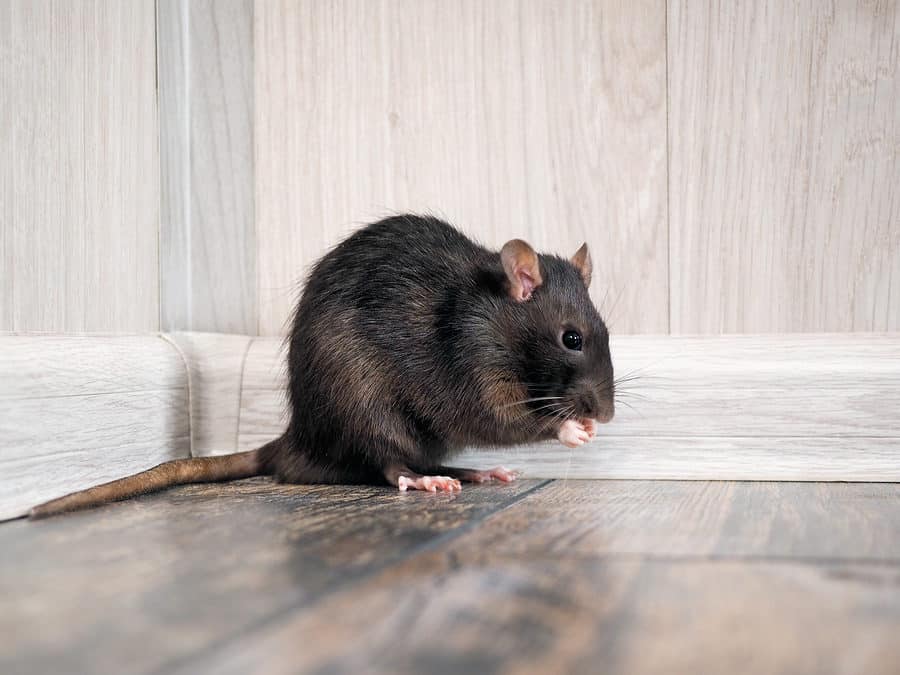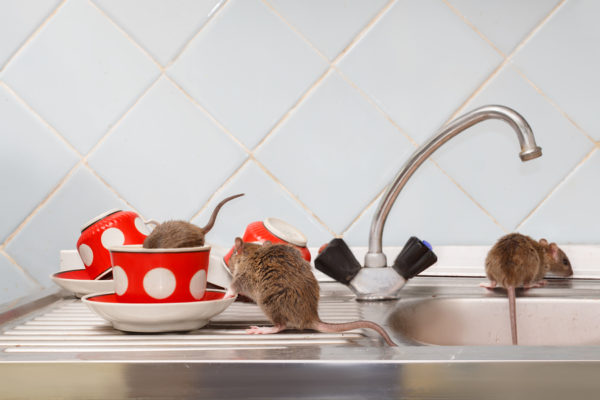READY TO GET STARTED?
REQUEST A FREE ESTIMATE
Fill out the form below or call (888) 466-7849 for a free, no-obligation estimate.

FACT. Rats are one of the most common pest issues homeowners face. Rats are known for being destructive by gnawing on structures in and around your home including utility pipes, wood structures, and wiring. In addition to the structural damage rats can cause, it is also possible for rats to pose serious health risks to humans. Diseases caused by rats can be transmitted through bites or scratches. Rat feces illness can be transmitted to humans through rat droppings and urine left around your home. Humans can also get sick through contaminated food caused by rats running across countertops where food is later prepared.
Just how sick can rats make you? Here are some common rat-borne diseases found in the United States.
Hantavirus pulmonary syndrome is a viral illness spread by deer mice, cotton rats, rice rats, and white-footed mice. HPS is spread by direct contact with rodents or their urine and feces, by breathing in dust contaminated with urine or droppings, or by bite wounds. Symptoms in the first phase of the virus include fatigue, fever, muscle aches, headache, dizziness, chills, nausea, vomiting, and abdominal pain. The symptoms then progress to coughing and shortness of breath. HPS is a severe and sometimes fatal respiratory disease with a 38% mortality rate. There is no specific treatment, cure, or vaccine for hantavirus infection.
Leptospirosis is a bacterial disease spread by rodents worldwide by either eating or drinking food and water contaminated with urine or contact through the skin or mucous membranes with water or soil that is contaminated with urine. Without treatment, leptospirosis can lead to kidney damage, meningitis (inflammation of the membrane around the brain and spinal cord), liver failure, respiratory distress, and even death. Common symptoms include fever, chills, headache, muscle aches, abdominal pain, vomiting, jaundice, diarrhea, and rash. The symptoms are often mistaken for other illnesses. If not treated, the second phase of symptoms includes kidney or liver failure or meningitis. The disease lasts between 1 and 3 weeks. Leptospirosis is treated with antibiotics.
Rat-bite fever is a bacterial illness spread by rats and possibly mice. The disease occurs worldwide and is spread through bites or scratches from an infected rodent, contact with a dead rodent, or eating or drinking food and water that is contaminated by rat feces. If not treated, RBF can be a serious or even fatal disease. RBF is not spread from one person to another. The early symptoms of RBF can be similar to the symptoms of other medical conditions. Common symptoms include fever, headache, muscle pain, headaches, vomiting, joint pain, and rash. If the illness progresses, more severe complication can arise such as abscesses, hepatitis, kidney infections, pneumonia, meningitis, or infections in the heart. RBF is treated with antibiotics.
Salmonellosis is a bacterial disease found worldwide that is spread by rats and mice. Salmonellosis is spread through eating or drinking food and water that is contaminated by rat feces. Salmonellosis is an infection caused by the Salmonella bacteria. Although commonly spread when a person eats contaminated food, the bacteria also can be passed between people and animals. Common symptoms include diarrhea, vomiting, fever, and abdominal cramps. Salmonella infections in people usually resolve within 5-7 days, and most do not require treatment other than drinking plenty of fluids. People with severe diarrhea may need to spend time in a hospital getting rehydrated with intravenous fluids.
Rat-borne diseases can cause serious and sometimes fatal illnesses in humans. The best way to avoid these diseases is to prevent rats from infesting your home in the first place. Here are some common home rat prevention tips:
Request a Free Wildlife Control Estimate
The Dos and Donts of Bird Nest Removal
When Should You Be Concerned About A Spider Bite?

Fall approaches, and with it comes crisp air and the hint of colder weather. Our natural response to colder weather is to stay inside more for warmth and shelter. You may not be alone in finding shelter in your home. Animals, specifically rodents, such as rats, mice, squirrels, and chipmunks, among others, often find a way in your house as they come for the food and stay for the warmth.
These rodents represent a significant problem to both your property and your health. They can chew though wallboards, wood, cardboard, and electrical wiring. Chewed up electrical wires, especially, are a big problem due to the potential risk of starting fires.
The diseases rodents can carry are just as big a concern as potential property damage. Diseases ranging from hantavirus to salmonellosis to rat-bite fever can be fatal, especially for children and the elderly.
Hantavirus is transmitted to humans from exposure or inhalation of rodents’ urine or feces. Early symptoms include fatigue, fever, and muscle aches. Infection with hantavirus can lead to Hantavirus Pulmonary Syndrome (HPS), which can be fatal.
Salmonellosis is an infection cause by salmonella bacteria. It is spread through rodent feces, most commonly through the consumption of contaminated food. Most people have symptoms like diarrhea, fever, vomiting, and abdominal cramps.
Rat-bite fever is an infectious disease that is spread from bites or scratches from infected rodents, even simply handling infected rodents without a scratch could lead to the disease. Symptoms include fever, vomiting, muscle and joint pain, and rashes. If not treated, it can be a potentially fatal disease.
Sometimes rodents in your house can feel more like an annoyance or minor inconvenience, but they can pose a serious threat to you, your family, and your property. If you see any signs of rodents in your home, contact a professional pest control company to ensure they don’t multiply and do some serious damage.

The NPMA recently posted an article on their website that explained the dangers that rodents can cause to your home and your health. We often talk in our blogs about the unsanitary conditions and the property damage that a rodent infestation can lead to but we rarely discuss the health risks that are involved.
Rodents, such as mice and rats, can leave droppings that can spread bacteria, contaminate food, and cause allergic reactions. Droppings can also spread diseases and viruses such as the following:
To read the full article or get more information on the diseases above click HERE.
Please don’t take chances with the health of you or your loved ones. If you have rodents in your home, call a licensed exterminator, Northwest Exterminating, to get rid of the rodents in your home.
Source: http://www.pestworld.org/news-and-views/pest-articles/articles/health-threats-posed-by-rodents/